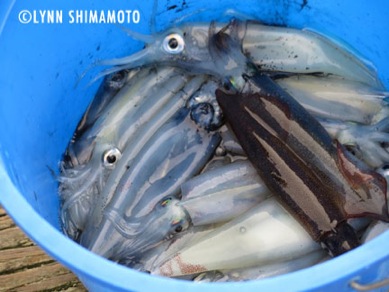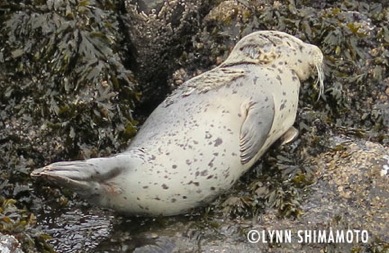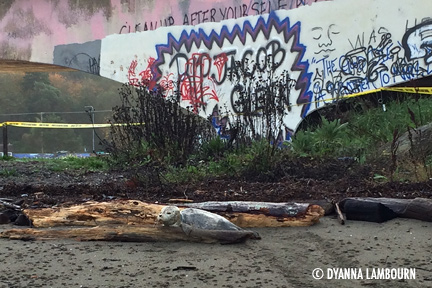Nov 2014
Butterball and Stuffin' on Seal Sitters' plate Thanksgiving night
Nov/28/14 09:20 AM
Last night, Seal Sitters’ volunteers protected two seal pups trying to get some rest out of the cold waters of Elliott Bay. Butterball made a return appearance to West Seattle and a seemingly healthy and very feisty seal pup, nicknamed Stuffin’, arrived later in the evening. Thankfully, the two pups ended up close together and the perimeter of tape and signage that was already in place to protect sleeping Butterball was extended, ensuring that both pups were inside a clearly defined buffer zone.
The pups were gone at a 6am check and our rain-drenched first responder removed all materials from the area. We anticipate that one or more of the pups will continue to use this not-so-ideal location as long as squid and small bait fish are abundant in the Bay. Off-leash dogs and curious people are always a danger to vulnerable harbor seal pups - and a spunky pup such as Stuffin’ can inflict a serious bite if approached too closely. Diseases can be transmitted between species. The Marine Mammal Protection Act mandates that it is against Federal law to disturb, feed, handle or move any marine mammal. So, please - always stay far back and leash dogs if you see a pup onshore. We hope both pups find a safer haulout with less potential for conflict.
The pups were gone at a 6am check and our rain-drenched first responder removed all materials from the area. We anticipate that one or more of the pups will continue to use this not-so-ideal location as long as squid and small bait fish are abundant in the Bay. Off-leash dogs and curious people are always a danger to vulnerable harbor seal pups - and a spunky pup such as Stuffin’ can inflict a serious bite if approached too closely. Diseases can be transmitted between species. The Marine Mammal Protection Act mandates that it is against Federal law to disturb, feed, handle or move any marine mammal. So, please - always stay far back and leash dogs if you see a pup onshore. We hope both pups find a safer haulout with less potential for conflict.
Seal pup Butterball arrives just in time for Thanksgiving
Nov/27/14 08:52 AM
Seal Sitters’ hotline operator Dave fielded a call last evening of a pup on the dock at a boat launch. First responder Lynn was on the scene within minutes and fellow responders David and Robin were right behind her. They blocked off access to the dock with barricades and Protected Marine Mammal tape. After observing the pup for some time, responders left the deserted and quiet area. The pup, nicknamed Butterball, was snoozing soundly - and safely - at the end of the wooden structure.
Lynn (with husband Don in tow) checked on Butterball at 9pm and he was still fast asleep, with no people in sight and the perimeter intact. This morning at 6am, he was gone - probably out for a breakfast of squid and small herring that are frequenting Eliiott Bay now.
As always, if you see a seal pup or other marine mammal onshore, please call Seal Sitters’ dedicated hotline at 206-905-SEAL (7325).
Butterball is one of only a few pups we have had in the past month - much quieter than any prior year. After a lengthy conversation with our consulting WDFW marine mammal biologist, perhaps we are seeing less pups onshore this season because the population is actually healthier than usual. While we have had more than our share of death, on the other hand, we haven’t had as many emaciated pups resting on West Seattle’s busy beaches as last year. Maybe there are more successful pups this 2014 season who are choosing to rest at night, like Butterball, on docks and offshore platforms - or on less accessible beaches with fewer people and dogs. Indeed, this year in area rookeries there was significantly less mortality of newborn and newly-weaned pups. While volunteers miss being able to protect these amazing wild animals, it is certainly much better that they rest in less dangerous locations.
On this day of thanks, Seal Sitters MMSN would like to recognize our volunteers for your unwavering dedication to helping marine life - you are AWESOME! We would also like to thank the public for your continued support - we can’t do it without you! We are grateful for our partner stranding networks in the Pacific Northwest. The seals and other marine mammals are so lucky to have all of you. Seal Sitters wishes everyone a wonderful Thanksgiving Day.
Lynn (with husband Don in tow) checked on Butterball at 9pm and he was still fast asleep, with no people in sight and the perimeter intact. This morning at 6am, he was gone - probably out for a breakfast of squid and small herring that are frequenting Eliiott Bay now.
As always, if you see a seal pup or other marine mammal onshore, please call Seal Sitters’ dedicated hotline at 206-905-SEAL (7325).
Butterball is one of only a few pups we have had in the past month - much quieter than any prior year. After a lengthy conversation with our consulting WDFW marine mammal biologist, perhaps we are seeing less pups onshore this season because the population is actually healthier than usual. While we have had more than our share of death, on the other hand, we haven’t had as many emaciated pups resting on West Seattle’s busy beaches as last year. Maybe there are more successful pups this 2014 season who are choosing to rest at night, like Butterball, on docks and offshore platforms - or on less accessible beaches with fewer people and dogs. Indeed, this year in area rookeries there was significantly less mortality of newborn and newly-weaned pups. While volunteers miss being able to protect these amazing wild animals, it is certainly much better that they rest in less dangerous locations.
On this day of thanks, Seal Sitters MMSN would like to recognize our volunteers for your unwavering dedication to helping marine life - you are AWESOME! We would also like to thank the public for your continued support - we can’t do it without you! We are grateful for our partner stranding networks in the Pacific Northwest. The seals and other marine mammals are so lucky to have all of you. Seal Sitters wishes everyone a wonderful Thanksgiving Day.
Squid lures seal pups and fishermen to area piers
Nov/19/14 08:58 AM

The most common species is “market squid” (Loligo opalescens) which is found in Washington inland waters year-round, but more abundant during the cold late fall months through February. Measuring about 8”, these squid are called calamari when served in restaurants. However, not only are they a taste delight for diners, they are also a favorite delicacy of young harbor seal pups.

Unfortunately, fishing piers can pose dangers for seals of all ages. Hungry seals are also attracted to light and fishing lures, especially those with clinging 8-armed squid or baited with small fish. A swallowed lure is almost always fatal and discarded monofilament line can be equally hazardous - always dispose of fishing gear responsibly! We do hope Squidoo continues to forage safely around the pier and pack on a thick layer of blubber for warmth in the cold, challenging months ahead.
Though hardly robust, Squidoo was certainly on the plump side compared to the skinny pups we have monitored this very strange seal pup season. Seal Sitters MMSN has not had a response to a live pup onshore since October 27th. Typically, October is a very busy month for responders and volunteers who look after a myriad of pups in all sizes and conditions. Not so this season with fewer pups and more deaths. Squidoo was a welcome sight and long overdue.
Researchers identify killer virus attacking Pacific sea stars
Nov/18/14 05:56 AM
A team of both American and Canadian researchers have finally identified a deadly virus which has wiped out millions of sea stars along the Pacific Coast. Known as “sea star wasting disease”, the virus causes limbs to waste away, fall off and essentially causes the animal to melt to a slimy pile of jelly. Once-healthy sea star populations have virtually vanished from many areas in Puget Sound, including West Seattle’s once vibrant tide pools at Constellation Beach. Pier uprights, once covered in brightly colored sea stars, are now bare. Local researchers, including those at the Seattle Aquarium, have been highly involved in the urgent quest to find the killer before entire populations vanish. Area beach naturalists have been providing valuable data and sea star counts at low tides. Seal Sitters’ volunteer Buzz Shaw, retired Seattle Aquarium zoologist and now a beach naturalist, comments that it is interesting that he chose the past few years to do his sea star and invertebrate counts at Constellation, “never dreaming of the value of the baseline.”
Yesterday, the research team released their findings in a scientific paper you can read here. For a layman’s explanation of the findings, read the Smithsonian article here.
For additional in-depth information, watch the PBS NewsHour/Earthfix segment on wasting disease, featuring underwater video by West Seattle diver and environmental advocate Laura James.
Yesterday, the research team released their findings in a scientific paper you can read here. For a layman’s explanation of the findings, read the Smithsonian article here.
For additional in-depth information, watch the PBS NewsHour/Earthfix segment on wasting disease, featuring underwater video by West Seattle diver and environmental advocate Laura James.
Rehabbed Canadian seal pup visits South Puget Sound
Nov/13/14 03:18 PM

Dyanna noticed the pup had a 4-digit tag on the left rear flipper, indicating a stint at a rehab facility. In Washington State, rehabilitated pinnipeds have a 5-digit tag. She taped off the area with yellow Protected Marine Mammal tape, posted informational signs and observed behavior at length before leaving the somewhat secluded location, popular with a “party” crowd. Early the next morning, the pup was back on the beach.

Three months later, far away in Washington, WDFW monitored Lithium’s activities in South Puget Sound for 5 straight days. Lithium, wary of human presence, was observed coming and going from the beach at different times - a good sign. The spit is the only place to haul out and rest in that area when there are extreme high tides, such as last weekend. It is located in Burley Lagoon, a shallow estuary with lots of small bait fish, cutthroat trout and chum salmon returning this time of year. Thankfully, there has not been much boat traffic or gillnet fishing of late. Other seals have been observed routinely resting on the oyster floats inside the lagoon in the early morning or late afternoon. The pup is in fair body condition, common to many struggling weaned pups during late fall and winter months. We hope our visitor from north of the border packs on some much-needed pounds. Lithium was last sighted on Sunday afternoon.
A recent study by SeaDoc Society of satellite-tagged harbor seal pups revealed that rehabbed pups travel much farther in search of food than wild-weaned pups - in fact, three times as far and wide. This would only contribute even more to Lithium’s low body weight as she expends more calories traveling greater distances. Seals usually stay within a 5-mile radius their entire lives. If you happen to see a tagged animal, please inform your local marine mammal stranding network of the location (map with networks contact info here). This information is extremely valuable in helping biologists determine success rates of rehabbed seals.







